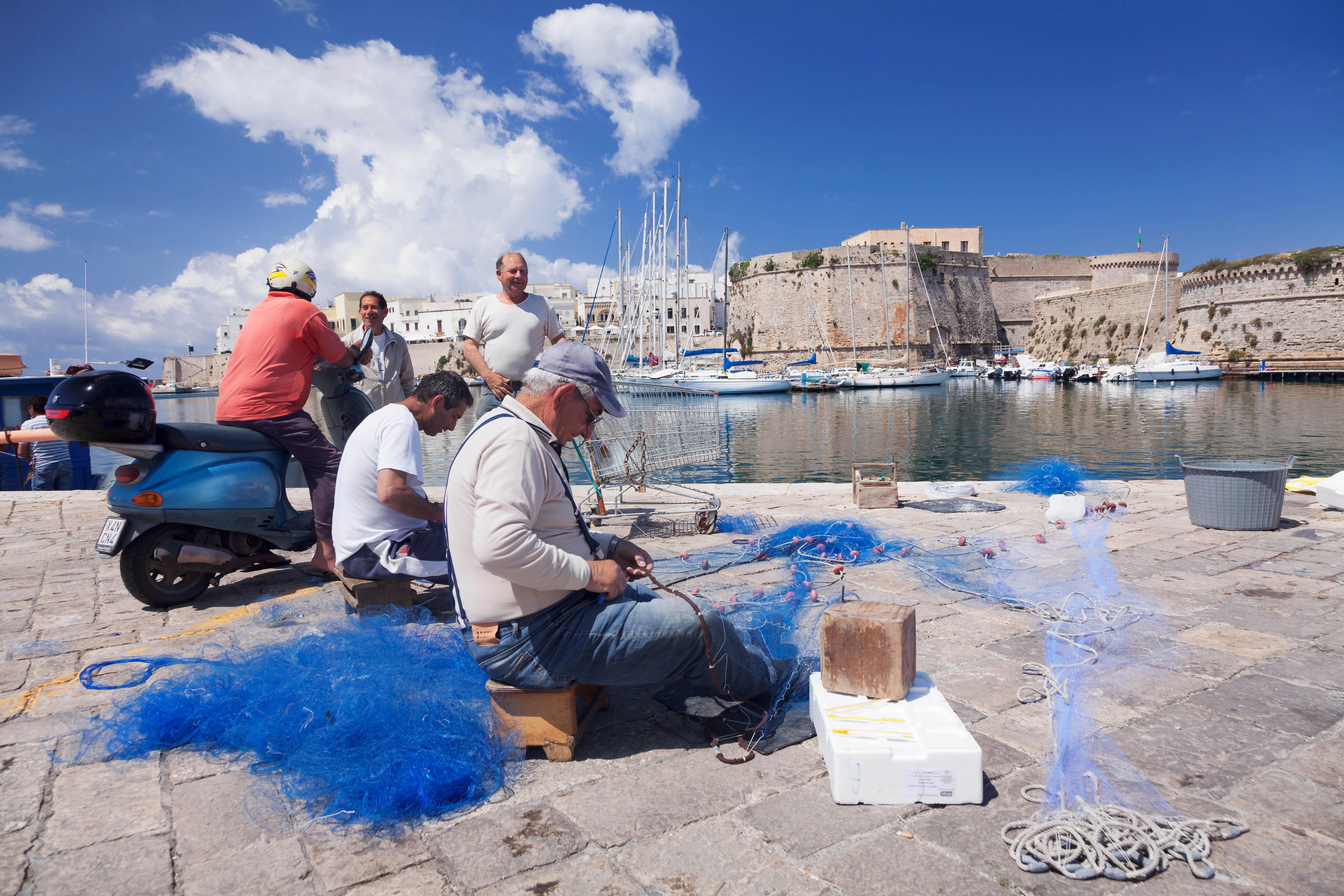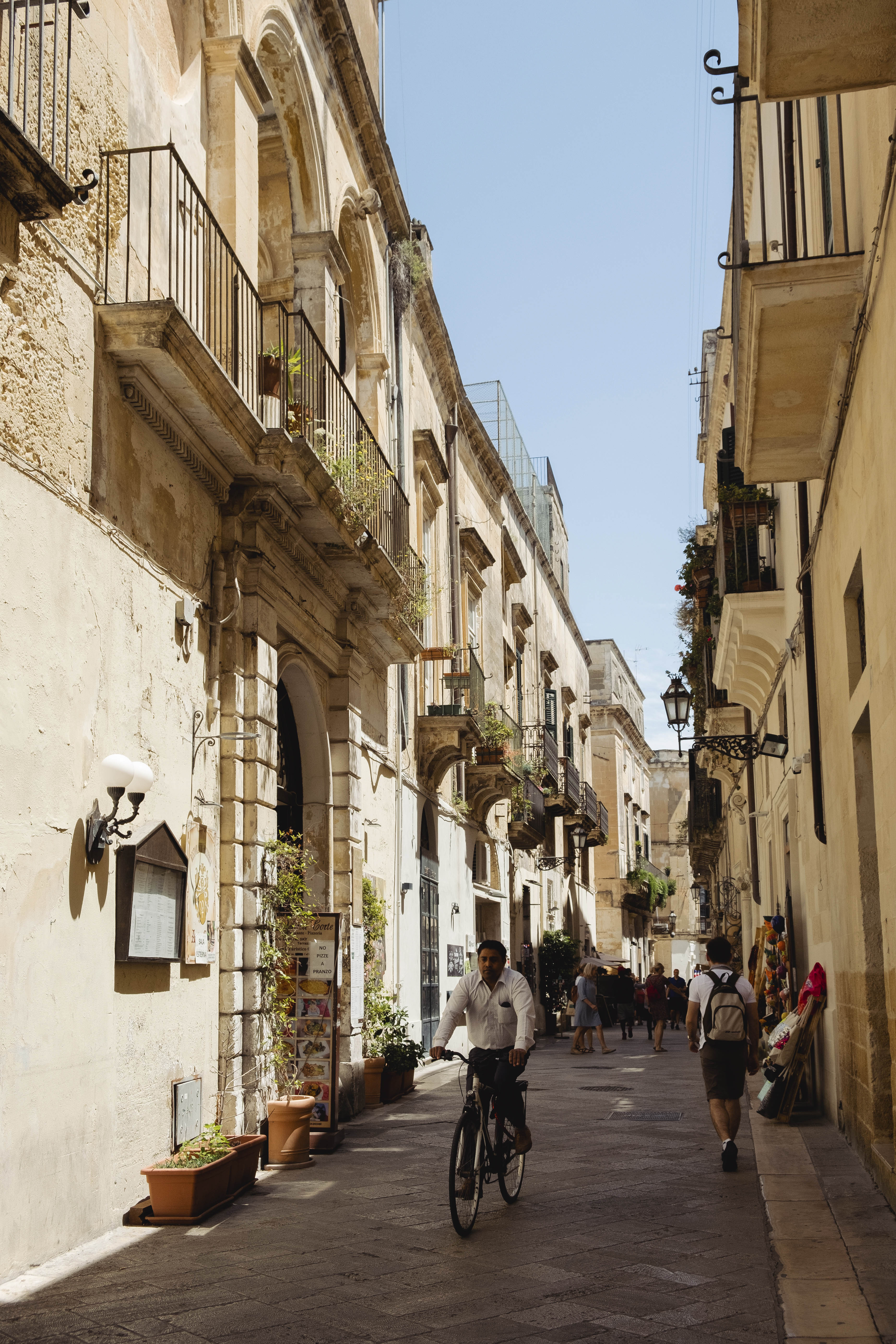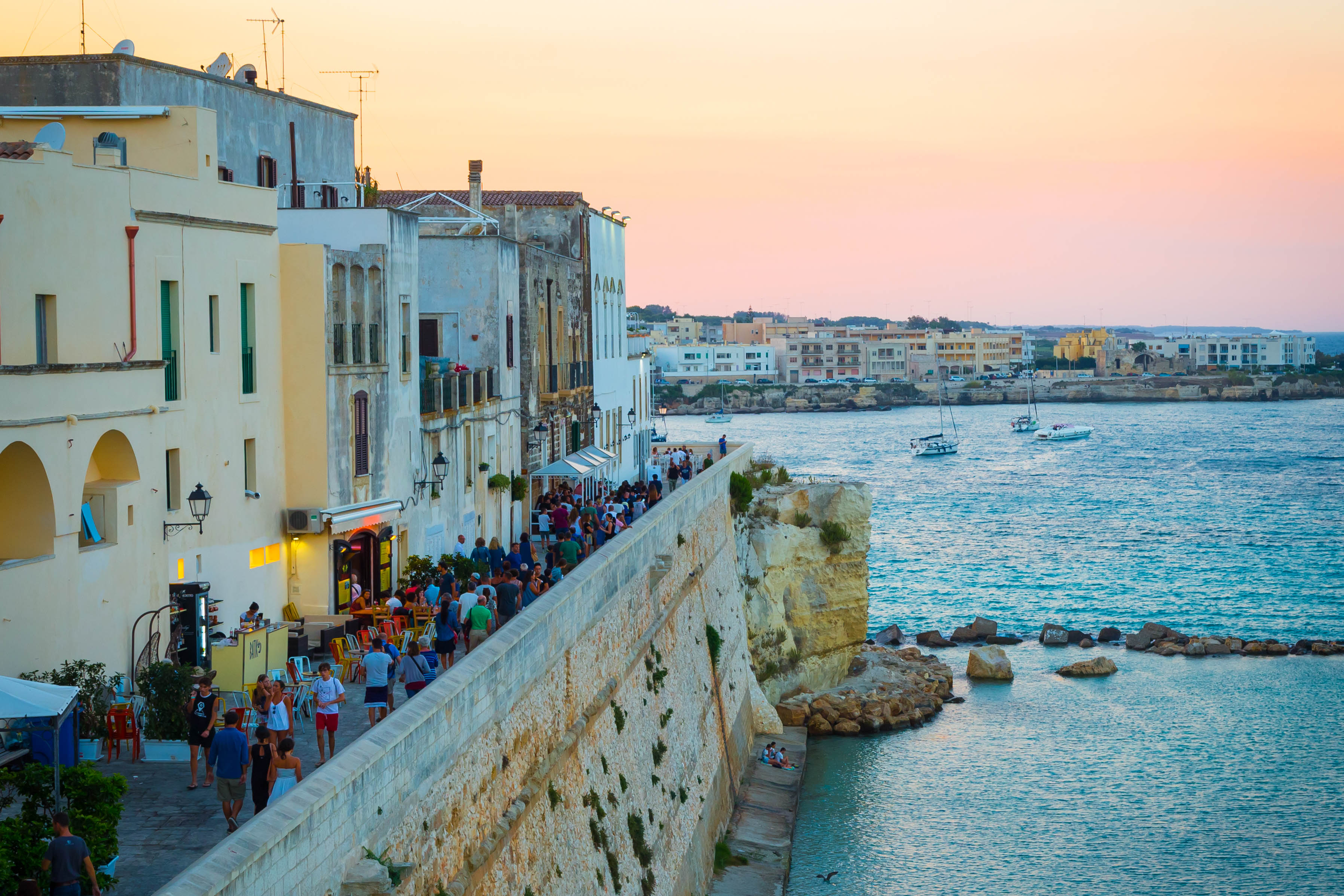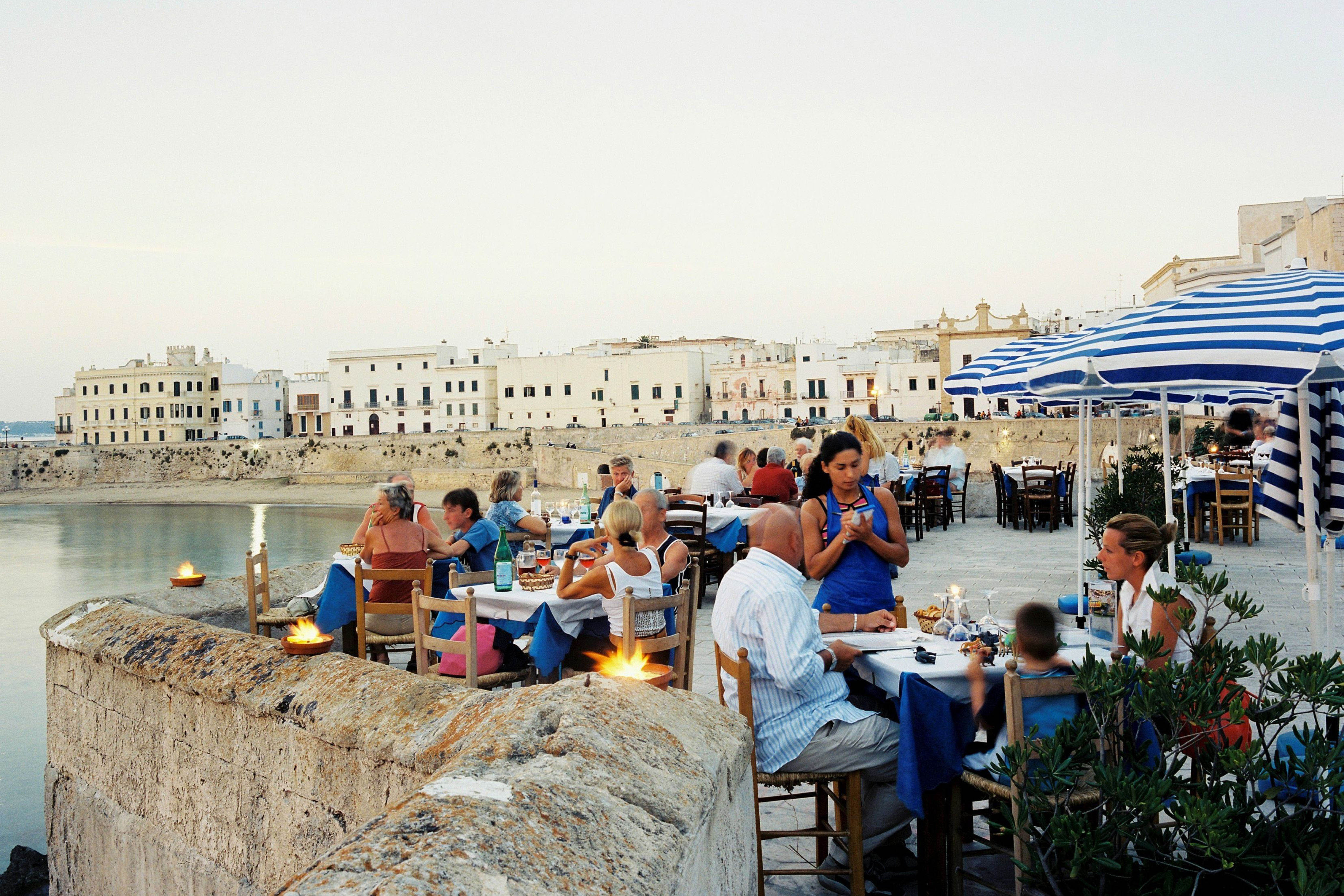Photography by Gregor Lengler
It is early evening in Maglie – a small town 30km south of Lecce and the air is humming with clattering plates and the occasional whine of a Vespa. At Caffe della Libertà on Piazza Aldo Moro, my spritz glows orange in the fading sun as the evening unfolds in gloriously unhurried detail: a group of three old men deep in reminiscence, a toddler in a bubblegum pink tutu on her father’s shoulders. Teenagers drift past, their chatter as animated as the swifts screeching and wheeling around the belltower.
And here’s the unexpected thrill: I am not just observing, I am understanding. The laughter when one of the old men cracks a joke about the price of wine, the cries of “basta!” from a mother to her child, the digressions from politics to the growing heat – “troppo caldo!” – all suddenly make sense. A few days into my Italian language course and the talk in this honey-toned town is no longer background noise, but a story unfolding in real time – with me a part of it.
In recent years, language learning has surged among older UK adults. The British Council reported increased enrolments in adult evening classes, while Rosetta Stone and Babbel saw global user spikes of 65% and 40% respectively during lockdowns. The popular language learning app Duolingo alone saw a 67% rise in UK users.

Net benefits: fishermen at the harbour in Gallipoli
In part, this was driven by a desire not just for mental stimulation, but also for more textured, satisfying holiday experiences. For some of us, sightseeing isn’t enough. What we want is to understand the daily rhythm of life: the supermarket shop, the bar gossip, deciphering a menu. We want to be a part of the action, not observers to it.
I kicked off with an excellent online school – Joy of Languages, if you’re curious – and have now reached a reasonably proficient level in Italian. Still, I get tongue-tied over mistakes (enough to rattle my fantasies of becoming a pretend nonna in an Italian seaside town), which is why I’ve come to Puglia for an immersive Learn Italian week with Flavours Holidays. I’m not chasing perfection, just confidence.
The same goes for the three other learners, each of us gladly swapping apps and Zoom classes for something more tactile, human, and rooted in place. Better still, we have a bubbly, Sicily-born teacher, Alessia, who deftly balances our different proficiencies through fun quizzes, lessons in Italian gestures (my favourite? The finger-to-cheek swivel, denoting something delicious) – and stories linked to our excursions.
Our base is Palazzo Garzia, a noble 18th-century pile in the centre of this unassuming town. Limestone walls keep out the broiling heat, a plant-draped courtyard doubles as our classroom, and our enormous bedrooms are lofty, star-vaulted and antique-stuffed. I grow addicted to early-morning reveilles from those squealing swifts, chasing through the limpid sky like benign schoolboy hooligans – and to the bell chimes booming out the hour, the campanile’s mosaic dome burnished by the sunshine.

Escape the heat: a shaded street in Lecce
It’s a far cry from your typical Puglian escape: the tourist-rammed trulli towns of Alberobello and Ostuni, beloved by Instagrammers – in fact, we rarely hear English voices during our week. A few, certainly, on our trip to Otranto, but none in Maglie. That, alone, incentivises us to take courage and speak out.
Our days fall into a pleasing rhythm of morning lessons, then prosecco and nibbles at 12.30. “Ti aiuterà a parlare!” insists Alessia as she pops the cork – and she’s right. We lose our inhibitions and start chatting in Italian, even singing, when we learn that Domenico Modugno, who composed the 1958 Eurovision winner, Nel Blu Dipinto di Blu, came from this region. “Volare!” warbles a classmate, running through the song’s chorus, dreamy-eyed.
Newsletters
Choose the newsletters you want to receive
View more
For information about how The Observer protects your data, read our Privacy Policy
That lesson also revealed a link between the 1960s former prime minister, Aldo Moro, and Santa Claus. Moro was born in Maglie; St Nicholas became the patron saint of neighbouring Bari. We’re picking up not just local history, but useful vocab, too: singer, birthplace, saint and legend among them.
Lessons are followed by simple but delicious lunches in the palazzo’s dining room, cooked by sisters Raffaela and Cristina (I won’t easily forget their courgette lasagne, nor the dinky orecchiette pasta with tomato sauce). Then it’s time for a rest, before excursions.

‘Passeggiata!’: crowds walking at sunset in Otranto
First, Otranto – touristy, but peaceful in its basilica, its mosaic floor a medieval “paradiso e inferno” scene of lions, horned satanic figures and elephants.
Gallipoli, by contrast, is ours alone. The old town perches over the Ionian sea in a wind-buffeted huddle of whitewashed houses and tangled alleyways – the wild sea ever present.
We chat with an old lady embroidering silk on her flower-festooned balcony. “Sono Maria!” she calls, showing us her handiwork, then blows us kisses from gnarled, bunched fingers. Later, there’s rheumy-eyed Luigi, a former skipper, weaving baskets in a shady doorway. The town philosopher, he rattles on about how life would improve if we observed the sea’s rules and protected water for all.
“Hai ragione” – you’re right – I tell him, pleased that I can understand him, despite his thick accent, less pleased that I’ve thereby encouraged further cryptic musings. Eventually we break away, following our noses to the harbour, where men haggle over crates of just-caught fish: 5kg selling, unbelievably, for just €10.
Lecce itself uncovers ornate baroque façades and sluggish sightseers, and a tucked-away local osteria where jokey head waiter Dario berates us for our poor appetites. “I will fetch the chef if you don’t finish that parmigiano,” he grins.
But two moments in particular stay with me. First, my visit to Monia the hairdresser, where we chat in Italian about split ends and the rumoured love life of the new pope, courtesy of a gossip magazine. I leave with better hair and brighter confidence.
The second: dinner at Mallie pizzeria. A handsome priest enters, flanked by five men. He catches my eye. “Buonasera,” he smiles. Whispers ripple around us. It’s Don Antonio Coluccia – a famed, highly active anti-Mafia priest. His companions? Armed bodyguards. “They’re his guardian angels,” someone tells me.
These glimpses of real Puglia – layered, unpredictable, deeply human – remind me why I persist with Italian. No grammar exercise in the quiet of my study ever gave me such a tangible connection to both Italy and its language.
Winning words: other language holidays
French in Montpellier
Enjoy immersive tuition in Sancerre, the Loire’s idyllic wine-making town. Combine work with practical tasks: a pretend parcel-sending mission to the post office, or to the boulangerie for croissants. Your base for the week is a 16th- century former town hall. From €485pp excluding travel and accommodation (coeurdefrance.com).
Spanish in Cadiz
Experience real Spanish life on this relaxed Valencia holiday where lessons and accommodation take place in your tutor’s charming home. Master conversational Spanish alongside fun excursions and meals in local restaurants. From €1,550pp full-board, excluding travel (spanishexpress.co.uk).
German in Berlin
Keen for fast language progress? This intensive five-day course combines four daily lessons, cultural visits and weekend trips to Potsdam, Leipzig or Dresden. From €225pp excluding travel and accommodation (gls-german-courses.de).
Japanese in Tokyo
As Squid Game drives a craze for Asian language learning, where better to grasp the phonetical intricacies of Japanese than in the country’s fascinating capital? This intensive week includes group classes and optional cultural activities. From £365pp excluding travel and accommodation (genkijacs.com).
Louise Roddon was a guest of Flavours Holidays. A week of learning Italian in Puglia costs £1,899pp, all inclusive (no single supplement), but excluding flights (flavoursholidays.co.uk/learn-italian/puglia)
